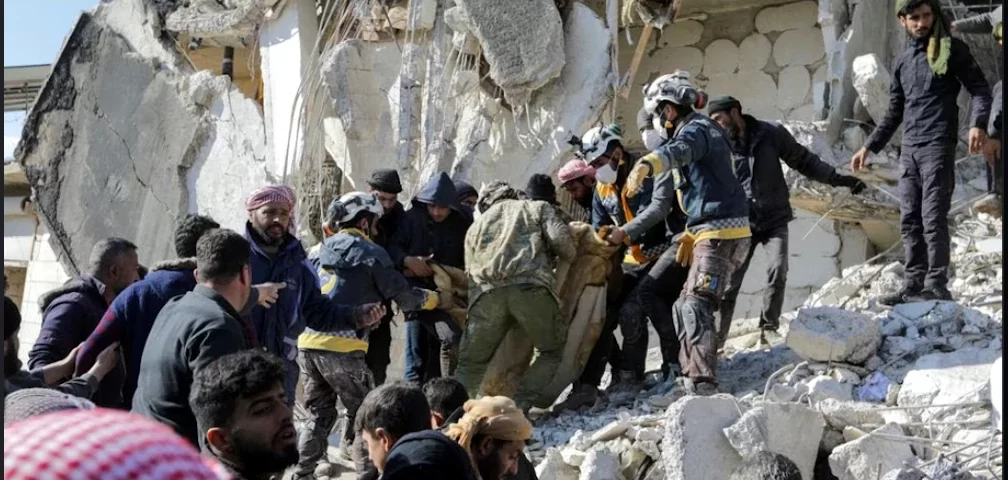Brutally politicizing humanitarian aid, Biden assists Turkey but refuses to mobilize aid and rescue workers to save thousands in northern Syria because of U.S. vendetta against Bashar al-Assad government.
Even with GL 23, which gives western banks permission to transmit funds for earthquake assistance, U.S. banks refuse to do so. The risk (from secondary sanctions) is too great, the time span too short (it is only in effect until early September), and the amount of work necessary to legitimate the funds moving through is too great. So, the aid organization I work with has been struggling for days to find a clear conduit through which we can transfer funds to Syria. As you will see, moving people and resources is even more difficult. [jb]
At 4:17 a.m. on February 6, a 7.8-magnitude earthquake struck Turkey and northern Syria, killing more than 21,000 people in what was the deadliest earthquake seen worldwide in more than a decade.
The Biden administration announced on Monday, soon after the quake struck, that it was coordinating any and all needed assistance with Turkish officials, deploying quickly to support Turkish rescue efforts, and sending a USAID disaster response team into Turkey.
Team Biden was much more muted with regards to Syria, stating that “U.S.-supported humanitarian partners are also responding to the destruction in Syria.”
These comments made clear the Biden administration’s refusal to work with the Syrian government, which has been the target of a U.S. regime-change policy since the early 2000s.
The humanitarian groups to which Biden is referring are NGOs operating in areas outside the control of the Syrian state, which may yet exclude the rest of the country from any such aid, including the badly hit city of Aleppo, which is under Assad government control.[1]
State Department spokesman Ned Price told reporters: “I will make the point that it would be quite ironic, if not even counterproductive, for us to reach out to a government that has brutalized its people over the course of a dozen years now—gassing them, slaughtering them, being responsible for much of the suffering that they have endured.”
These statements are callous, misleading and hypocritical.
Callous because of the desperate need for aid to reach Syria to save lives regardless of politics.
Misleading because Price suggests that the Assad government gassed its own people using chemical weapons when strong scientific evidence suggests that these alleged chemical gas attacks, if they actually took place, were carried out by Syrian rebel forces backed by the U.S. and Turkey.
And hypocritical because Washington supports many governments that brutalize their people—including Turkey, which a) has a ghastly record of terrorizing the Kurds; b) supported ISIS in Syria; c) supports Azerbaijan in its assault on Nagorno Karabakh; and d) has adopted increasingly autocratic measures toward dissidents at home under Recep Tayyip Erdogan.
But Turkey has been a U.S. ally for decades and a NATO member, and hosts the large Incirlik Air Base.
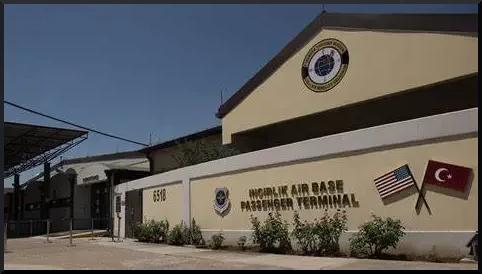

Erdogan’s government by contrast will gain in legitimacy from a strong response to the quake.
EU Countries and NATO Follow U.S. Lead
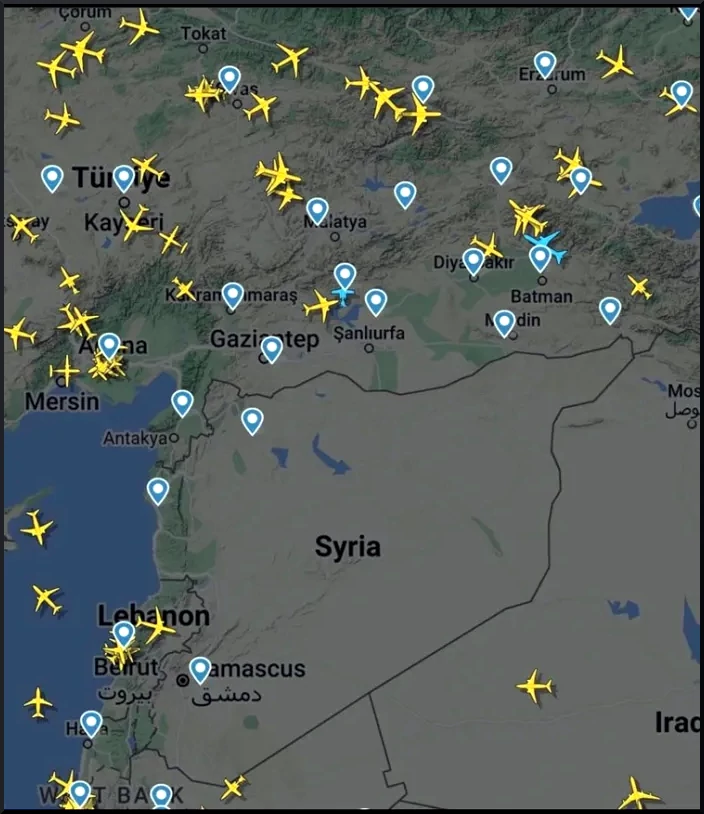
British Foreign Minister James Cleverly said the UK was sending Turkey a team of 76 search and rescue specialists, equipment, and rescue dogs as well as emergency medical teams.
Cleverly left out Syria, similar to other Western allies like Germany, Poland and even Greece, Turkey’s historic enemy, which pledged “immediate assistance” to President Erdogan, though not Syria’s Assad—even though Assad issued an international appeal for humanitarian aid.
Of the aid that is getting through, the majority is coming from the Global South. Transport planes from the U.A.E., Iran, Oman, Egypt, Iraq, Armenia, China, India, Pakistan, and Russia have landed in Syria loaded with aid; Lebanon has made its sea and airports available for aid shipments Syria, and even Palestine has sent a rescue team.
Great Difficulties
A surgeon from Aleppo, Mohamed Zitoun, who spent years treating casualties from the Syrian war, said that he has never experienced anything like the number of injured and the scale of their injuries from the earthquake, and that the hospital’s emergency teams where he worked at Bab al-Hawa near the Turkish border were running out of antibiotics, sedatives, surgical supplies, blood bags, bandages and drips.[3]
Syria is facing special difficulties responding to the earthquake because a) the only crossing between Syria and Turkey that is approved by the United Nations for transporting international aid into Syria is not functioning, according to UN officials, because of earthquake damage to roads around it; b) Damascus International Airport is still undergoing repairs and maintenance following an Israeli air strike on the facility on January 2, which hinders the landing of humanitarian aid; and c) because of the ravages bred by Syria’s 12-year war and the brutal economic sanctions imposed by the U.S. and EU, which are not being lifted.
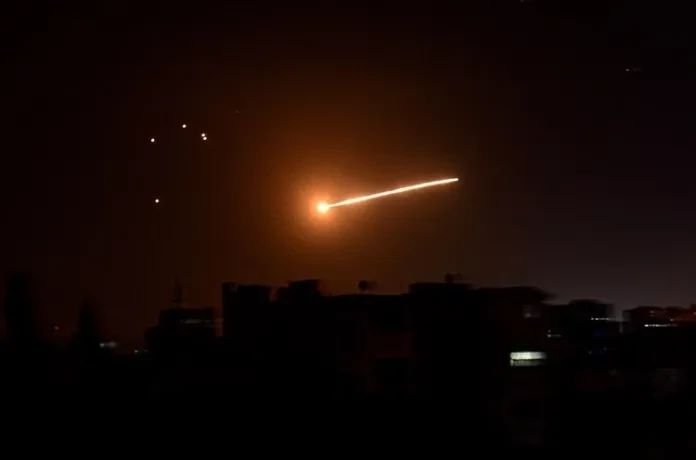
U.S. Sanctions and the Caesar Act—an Instrument of Regime Change
The Carter administration first imposed sanctions on Syria in 1979 when it designated Syria as a “state sponsor of terrorism.”
New rounds were imposed in 2004 and 2011 when the U.S.-backed uprising against Assad began and he was accused of human rights abuses.
In December 2019, President Donald Trump signed the Caesar Act, under which anyone doing business with the Syrian authorities potentially became exposed to travel restrictions and financial sanctions while vital medicines and foodstuffs were blocked from entering the country.
The Caesar Act was named after a government defector, Caesar, who leaked thousands of photographs alleging torture of civilians by Assad’s security forces.
Nearly half the photos actually showed government soldiers who had been killed and victims of car bombs and other war-related violence, and many others showed soldiers who had died in combat—not government torture centers.
Caesar’s identity was also unclear and he was suspected of being in the employ of the CIA.

“International cargo planes are unable to land at Syrian airports as a result of the U.S. and countries require Syrian airlines to transport aid on board their civil planes!!! As is well known, the so-called Caesar Act comes in the context of practicing economic terrorism and it is considered one of the most dangerous types of crimes against humanity.”

Beeley posted another statement from Aleppo businessman and former MP Fares Shehabi:
“Lift your God damned sanctions so we can open our airports to receive international aid! In Aleppo alone more than 50 buildings have been destroyed resulting in more than 160 deaths so far and thousands of injuries. Thousands of families are now without shelter! What kind of evil governments pose economic & travel sanctions on earthquake devastated nations?!”
So Sanctions May Not Turn into a Crime Against Humanity

Shehabi’s response was echoed by the Middle East Council of Churches (MECC), which called for the immediate lifting of sanctions imposed on Syria, charging that the current blockade has prevented their organization from carrying out relief operations for the earthquake throughout the country. “We urge the immediate lifting of sanctions on Syria and allowing access to all materials, so sanctions may not turn into a crime against humanity,” said the attendees of the Council in a statement.
Three prominent Christian leaders in Syria released a statement to similar effect, as did the UN Resident Coordinator in Syria, Mostafa Benjamilh, and the President of the Syrian Arab Red Crescent, Khaled Hboubati, who said during a press conference in Damascus that
“the evacuation process and rescue operations are restricted due to obstacles resulting from the severe sanctions. We have shortage in heavy machines and equipment needed to lift the rubble. I don’t mean trucks or bulldozers, I mean specific machines that lift rubble without injuring people trapped under the rubble…. Now, with this natural disaster, it’s time to lift the sanctions.”
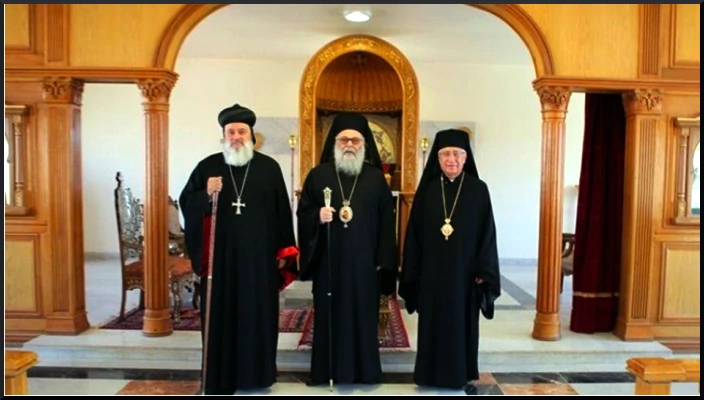
A Most Barbaric Response to Human Tragedy
Colonel (Ret.) Richard Black, who flew 299 combat missions in Vietnam and served in the Virginia State Senate as a Republican from 2012 to 2020, has been one of the few former high-ranking military officers or government officials to speak out against U.S. military intervention in places like Syria and Ukraine.
A day after the earthquake, Col. Black characterized the Biden administration’s response as “an act of vengeance against Syria’s rejection to submit to the U.S. regime-change war and sanctions imposed on their country for the past 12 years.”
Col. Black continued: “I have got to tell you, I have never seen such a barbaric response to a tragedy where you literally have people in Aleppo city, Syria who are looking up at piles of concrete, their lives are coming to an end, they’re freezing in the cold. They’re there without food, without water, and they’re dying. Meanwhile, the State Department takes that opportunity to re-emphasize the fact that we are bitter because we could not impose our will on the Syrian people.
“It was in 2020 that the United States imposed the Syria sanctions out of anger at the fact that Syria had driven back the ISIS and al-Qaeda terrorists that the United States had supported, and was trying to overwhelm the government with. So, now the State Department looks at this as an opportunity to simply ratchet up the regime of starvation and freezing that we have imposed on Syria through the cruel Caesar sanctions.
“I’m quite disgusted by the actions of the United States State Department. It is really unbecoming of any civilized nation that they would choose this moment to take out their vengeance on the poor suffering people of Syria.”
*Featured Image: Rescuers carry a victim on the rubble as the search for survivors continues in the aftermath of an earthquake, in rebel-held town of Jandaris, Syria February 7, 2023. REUTERS/Khalil Ashawi/File Photo AMMAN, Feb 8 (Reuters)
- Some of these organizations were infamous for staging false attacks to implicate the Syrian government in crimes it had not committed. Special advisor to Syrian President al-Assad, Bouthaina Shaaban charged that the West provides assistance to support terrorists in areas outside the control of the Syrian state, primarily concerned with protecting Daesh “ISIS,” “Jabhat al-Nusra” and the “White Helmets,” and isn’t interested in areas where most Syrians live.
- Bashar’s father Hafez had allied with Nasserist Egypt and the Soviet Union during the Cold War. ↑
- According to U.S. News & World Report, the hospital where Zitoun works is in an opposition-held enclave in northwest Syria, an area which bore the brunt of Russian and Syrian bombing during the country’s conflict, which killed hundreds of thousands, and where the towns are heavily populated with those who fled other areas of Syria. “The first massive wave of patients surpassed the ability of any medical team,” said the surgeon. The outpatient clinic was turned into a ward and mattresses were laid on the floor as the rooms filled with victims and despairing family members. “This is a huge calamity. I lived through shelling and survived massacres. This is totally different, terrifying and horrific.” ↑
